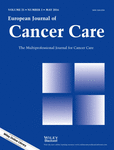Differences in trial knowledge and motives for participation among cancer patients in phase 3 clinical trials
Abstract
While participants in clinical oncology trials are essential for the advancement of cancer therapies, factors decisive for patient participation have been described but need further investigation, particularly in the case of phase 3 studies. The aim of this study was to investigate differences in trial knowledge and motives for participation in phase 3 clinical cancer trials in relation to gender, age, education levels and former trial experience. The results of a questionnaire returned from 88 of 96 patients (92%) were analysed using the Mann–Whitney U-test. There were small, barely relevant differences in trial knowledge among patients when stratified by gender, age or education. Participants with former trial experience were less aware about the right to withdraw. Male participants and those aged ≥65 years were significantly more motivated by a feeling of duty, or by the opinions of close ones. Men seem more motivated than women by external factors. With the awareness that elderly and single male participants might be a vulnerable group and participants with former trial experience are less likely to be sufficiently informed, the information consent process should focus more on these patients. We conclude that the informed consent process seems to work well, with good results within most subgroups.




